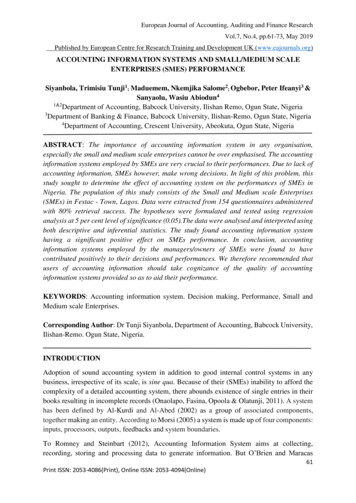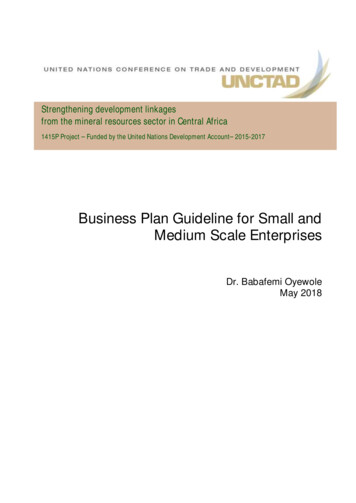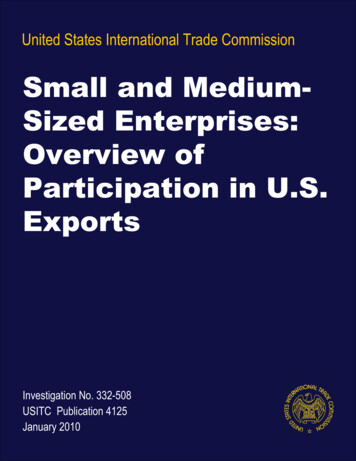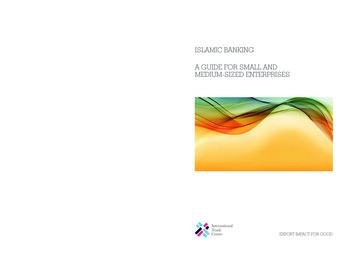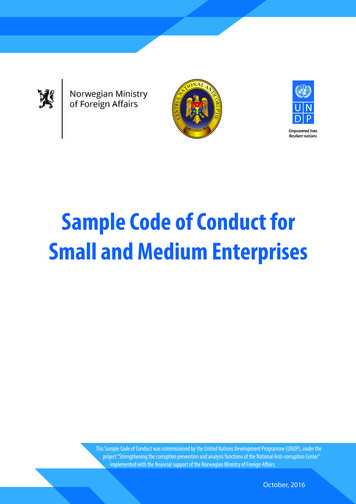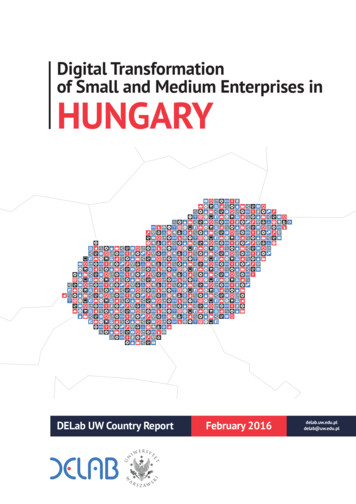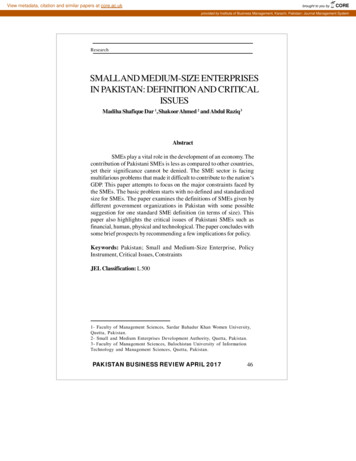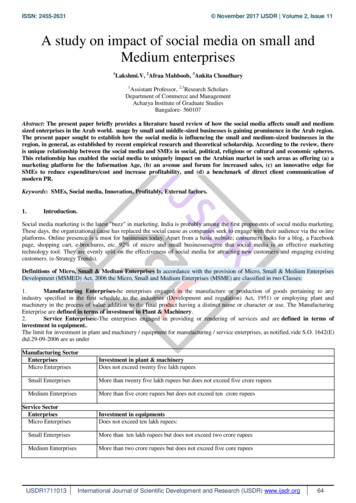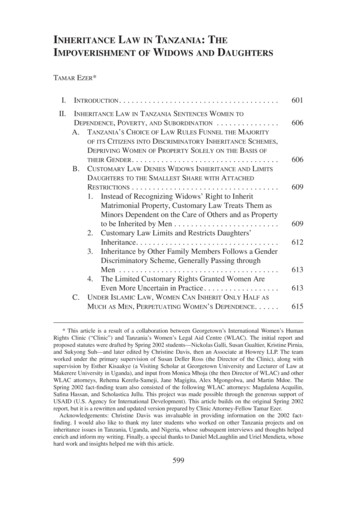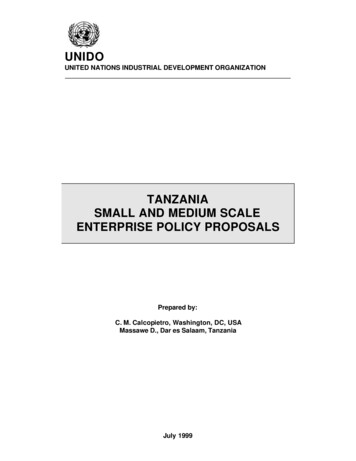
Transcription
UNIDOUNITED NATIONS INDUSTRIAL DEVELOPMENT ORGANIZATIONTANZANIASMALL AND MEDIUM SCALEENTERPRISE POLICY PROPOSALSPrepared by:C. M. Calcopietro, Washington, DC, USAMassawe D., Dar es Salaam, TanzaniaJuly 1999
ForewordThis report is based on the findings of a consultancy requested by the Tanzanian Government to theUnited Nations Industrial Development Organisation (UNIDO) and conducted in Dar es Salaambetween May and August 1999. The expert team was composed of Dr. Carlos M. Calcopietro and Mr.Massawe D. The views presented in this report are exclusive responsibility of the consultants.Senior Tanzanian Government officials, SME promotional institutions, donors, and private sectorrepresentatives with whom the consultants met in Dar es Salaam furnished most of the informationcontained in the report. The exercise has been circumscribed by the availability of data and the limitedtime to meet all relevant parties involved in SME promotion. No interviews were conducted outsidethe Dar es Salaam metropolitan area. A list of the interviewees, together with the literature reviewed tocomplement the primary data collection, is presented at the end of this report.The consultants are grateful to all Tanzanian and foreign personalities they have met and interviewed.The process of SME Policy formulation in Tanzania does not end with this report. On the contrary, itindeed intends to open a dialogue with all stakeholders in the country. The proposals here advancedare an invitation to produce more contributions from a variety of sources that should result in a widelyparticipatory public-private partnership.The next stage of the policy dialogue will take place on August 3, 1999. An SME Policy PreparationWorkshop organised by UNIDO will be convened at the UNDP Conference Room in Dar es Salaam todiscuss the proposals made in this document and any other cont ribution to be presented by thestakeholders.
Table of ContentsEXECUTIVE SUMMARYI.FRAMEWORK AND VISION GUIDING SME POLICY IN TANZANIA1.2.3.4.II.RELATED POLICIES - ROLE OF THE VARIOUS MINISTRIES INSME DEVELOPMENT1.2.3.4.5.6.7.8.III.BackgroundA Proposal to Define the Target Group of SME PolicyRole and Size of the SME sectorConstraints facing the SMEsResearch on SMEsCURRENT SUPPORT INSTITUTIONAL FRAMEWORK1.2.3.VI -Entrepreneurs WorkshopsConsultations with Promotional Institutions and Analytical WorkThe National Conference on SMEsThe SME Enabling ActOVERVIEW OF THE SMEs IN THE TANZANIAN ECONOMY1.2.3.4.5.V-Ministry of Industry and CommerceMinistry of Labour and Youth DevelopmentMinistry of Finance and the Bank of TanzaniaThe Vice President’s OfficeThe Planning CommissionMinistry of Agriculture and Co-operativesMinistry of Community Development, Women Affairs and ChildrenOther Related Ministries and PoliciesPROCESS OF SME POLICY FORMUL ATION1.2.3.4.IV -The Role of Government in SME DevelopmentSustainable Industry Development Policy (SIDP)The Tanzania Development Vision 2025SME Policies in EAC and SADC countriesFinancial FacilitiesNon-Financial SME Support ServicesAdvocacy on Behalf of SMEsOBJECTIVES, PRIORITIES AND PRINCIPLES1.2.3.ObjectivesPrioritiesPrinciples3
VII-COMPONENTS OF THE PROPOSED POLICY1.2.3.4.5.6.7.Creating an Enabling Legal FrameworkStreamlining Regulatory ConditionsEstablishing Differential Taxation and other IncentivesEasing Access to Credit, Equity and GuaranteesFacilitating Access to Business Advisory ServicesImproving the Physical Infrastructure and Business FacilitiesSupporting Access to Technology8.Encouraging Joint Ventures9.10.11.12.13.14.15.16.17.18.Supporting SME ExportsPromoting Rural IndustrialisationConforming with WTO RequirementsComplying with Environmental RegulationsAdopting Quality StandardsTraining in Entrepreneurship, Skills and ManagementCapacity-building and Institutional StrengtheningAdvancing Opportunities for Women and the YouthPromoting Networking and Support with UniversitiesFostering Linkages with Large EnterprisesVIII. A NEW INSTITUTIONAL FRAMEWORK FOR SME PROMOTION1.2.A Public/Private Partnership ApproachAn SME Department at the Ministry of Industry and Commerce3.4.5.6.The Small Enterprise Development AgencyRegional and District Business CentresThe National SME ForumA National Network of Private ConsultantsBIBLIOGRAPHYLIST OF INSTITUTIONS VISITED4
List of AcronymsAMKACharitable Trust supporting SME exportsBETBoard of External TradeBoTBank of TanzaniaCAMARTECCentre for Agricultural Mechanisation and Rural TechnologyCDCCommonwealth Development CorporationCIDACanadian International Development AgencyCOMESACommonwealth of Eastern and Southern AfricaCOMSECCommonwealth SecretariatCOSTECHTanzania Commission for Science and TechnologyCRDBCo-operative and Rural Development BankCTIConfederation of Tanzania IndustriesDANIDACo-operation Agency, Royal Embassy of DenmarkDBDCsTanzania District Business Development Centres (proposed)DFIDCo-operation Agency, British High CommissionDSITFDar-es-Salaam International Trade FairDSMDar es SalaamEACEast Africa Co-operationEPZsExport Processing ZonesERBEconomic Research BureauESRFEconomic and Social Research FoundationESAMIEastern and Southern African ManagementEUEuropean UnionFAIDAFinance Advice in Development Assistance to Small Enterprise PromotionFAOFood and Agriculture OrganisationGDPGross Domestic ProductGEARGrowth, Employment and Redistribution Macroeconomics Strategy, RSAGTZCo-operation Agency, Embassy of GermanyIFCInternational Finance CorporationILOInternationa l Labour OrganisationIPIInstitute of Production InnovationMEDAMennonite Development AssociatesMACMinistry of Agriculture and Co-operativesMECMinistry of Education and CultureMICMinistry of Industry and CommerceMIC-SMESmall Enterprise Section, Ministry of Industry and CommerceMFIsMicro-finance InstitutionsMoFMinistry of FinanceMoLMinistry of Labour and Youth DevelopmentMSTMinistry of Science, Technology and Higher EducationMWCMinistry of Community Development, Women Affairs and ChildrenNIGPNational Income Generation ProgrammeNGONon Governmental OrganisationNMBNational Micro Finance BankNORAD Co-operation Agency, Embassy of NorwayPCPlanning CommissionPREXExport Enterprise Re-conversion Programme for SMEs, ArgentinaPRIDEPromotion of Rural Initiatives and Development of EnterprisesPSIPrivate Sector InitiativesRBDCsTanzania Regional Business Development Centres (proposed)REPOA Research on Poverty AlleviationSACCOsRural Savings and Credit Co-operative So cietiesSADCSouthern Africa Development Co-operationSAEDFSouthern Africa Enterprise Development FundSATFSocial Action Trust FundSBAUS Small Business AdministrationSBDCsSmall Business Development Centres, United StatesSGRsSociedades de Garantia Reciproca, Argentina’s guarantee scheme5
SEBRAEServiço Brasileiro Apoio Empresario, SME support agency, Brazil SERCOTECServicio de Cooperacion Tecnica, SME support agency, ChileSIDASwedish International Development AgencySIDOSmall Industries Development OrganisationSIDPSustainable Industrial Development PolicySMIDOSmall and Medium Industries Development Organisation, MauritiusSMESmall and Medium-Scale EnterpriseSMEDA Tanzania SME Development Agency (proposed)SNVDutch Co-operation AgencySSMECAStrengthening Small and Micro-Enterprises, Co-operatives and AssociationsTAFSIO Tanzanian Federation of Small Industrial OrganisationsTBSTanzania Bureau of StandardsTCCIATanzania Chamber of Commerce, Industries and AgricultureTICTanzania Investment CentreTIRDOTanzania Industrial Research and Development OrganisationTPSFTanzania Private Sector FoundationTRATanzanian Revenue AuthorityTVCFTanzanian Venture Capital FundUN -CEDAWUnited Nations Conference on Education, Development and WomenUNDPUnited Nations Development ProgrammeUNIDO United Nations Industrial Development OrganisationUSAIDUnited States Agency for International DevelopmentVATValue-added TaxVETAVocational and Educational Training AuthorityVIBINDODSM Umbrella Association of Informal Sector OrganisationsVPOVice President's OfficeVPO-DoEDepartment of Environment, Vice President’s OfficeVPO-NGONGO Department, Vice President's OfficeZEGAZambia Export Growers Association6
Executive SummaryI.Framework and Vision Guiding SME Policy in TanzaniaThe Government of Tanzania, through its various policy measures aimed at developing a strong indigenous private sector, is currently addressing a wide range of social and economic development issues.This document introduces UNIDO’s contribution towards a formulation of a policy for the Small andMedium-scale Enterprise (SME) sector. The assumption is that the entrepreneurs themselves will playthe leading role in developing the sector but that the Government has the responsibility to facilitate theenabling environment required by SMEs to successfully compete in a market-oriented economy.The Sustainable Industrial Development Policy (SIDP) – 1996/2020 makes explicit reference to thepotential of SMEs and to the Government’s policy of support. The SIDP provides the overallframework for Tanzania’s future industrial development and lists specific national objectives. In termsof industrial branches to be promoted, SIDP assigns top priority to resource-based industries in whichTanzania has the potential to develop competitive advantage if properly matched with efficienttechnologies. SIDP also recognises the role being played by the informal sector in terms of promotingthe emergence of indigenous entrepreneurs. In addition to SIDP, the proposals towards an SME Policypresented in this document are oriented within the broader framework of the Tanzanian DevelopmentVision 2025.These SME Policy proposals for Tanzania also build on experience from similar policies in Eastern andSouthern African countries. Kenya already counts since 1986 with a policy framework that includesgovernment agencies, service institutions, micro-finance entities, public research bodies, private sectorconsulting firms, and SME associations. In Mauritius, SME Policy resulted from the enactment in 1993of the Industrial Expansion Act and the subsequent Small and Medium Industries DevelopmentOrganisation Act. The Export Processing zones play also a fundamental role in fostering SMEdevelopment through the encouragement of sub-contracting arrangements between foreign firms andsmall-scale local suppliers. In Namibia, SME Policy is in place since 1997 and includes supportmeasures such as a vendor development programme, development of sites and premises, export marketinvestigation, etc. In South Africa, the 1995 White Paper entitled “National Strategy for the Promotionand Development of Small Business” set up the basis for SME Policy.II.Related Policies – Role of the Various Ministries in SMEDevelopmentIn Tanzania, under the aegis of the Ministry of Industry and Commerce (MIC), the Small EnterpriseSection of the Department of Industries (MIC-SME) is responsible for co-ordinating initiatives insupport of craft and SMEs, including the preparation of sector guidelines for formulation of newpolicies and development strategies.The Ministry of Labour and Youth Development (MoL) is in charge of implementing the NationalEmployment Policy, sanctioned by cabinet in April 1997. This policy revisits the state of wageemployment in Government, parastatals, and the private sector and self -employment in agriculture andthe informal sector. The National Employment Promotion Service Act was passed by Parliament in03/1999. Special attention was given to the employment implications of micro and small enterprisedevelopment.The Bank of Tanzania (BoT) is in charge of financial sector supervision. In 1991, the Governmentinitiated financial sector reforms in order to create an effective and efficient financial system. Ruraland Micro-finance Policy is currently being completed, intending to set up rules to make these servicesbecome essential financial tools to address the financial needs of emerging entrepreneurs. Microfinance appears in various policy and strategy documents by Government ministries as an element intheir programs.
The Vice President’s Office (VPO) has an NGO Department that administers the National NGO Policy.NGOs play a key role in supporting poverty alleviation measures. NGO programmes are funded eitherthrough Government sponsored trust funds or through donor contributions and some of them targetentrepreneurial development and SMEs. VPO is also responsible for taking care of environmentalissues. T he National Environmental Policy was adopted in December 1997.The National Income Generation Programme (NIGP) was organised as a trust fund, under the aegis ofthe Planning Commission. It supports income generating and capacity building projects in agr icultureand rural development, infrastructure, micro-enterprises and informal sector activities. NIGP is alsoworking with private banks on a Mutual Credit Guarantee scheme. This initiative has importantlinkages to SME Policy.In 1997, the Ministry of Agriculture and Co-operatives (MAC) issued two policies – the Agriculturaland Livestock Policy, and the Co -operative Development Policy. The contents of these policiesinclude recommendations aimed at fostering the development of SMEs in Tanzania, primarily in thesub-sectors of food processing in rural areas.The policies and programmes of the Ministry of Community Development, Women Affairs andChildren (MWC) have also great repercussions and impact on SME Policy, especially with regard todesign and implementation of technical and business extension services to women entrepreneurs andmanagement of targeted education and training programmes.III.Process of SME Policy FormulationThe SME-MIC launched the SME Policy formulation exercise in 1998. F ive workshops wereconvened utilising the support network of the Small Industries Development Organisation (SIDO).This part of the exercise was funded and assisted by the Commonwealth Secretariat (COMSEC). Itresulted in the COMSEC Report, an important milestone in SME Policy preparation, which contributedto the understanding of the constraints faced by small entrepreneurs in Tanzania and provided a numberof indications on how to address the subsequent steps of the policy exercise.The second phase was launched in May 1999 with support provided by UNIDO. An expert teamsurveyed and maintained consultations with relevant SME organisations in the Dar es Salaammetropolitan area, and the various programmes in place. MIC approached the main stakeholders(Government, donors, private sector organisations, NGOs) explaining the need of an SME Policy inTanzania and requesting information on ongoing initiatives. At the conclusion of the consultations, theUNIDO experts prepared this document, which will be discussed in early August 1999 during the SMEPolicy Preparation Workshop. In parallel with advancing the policy preparation, MIC-SMErepresentatives will conduct study tours to countries with successful SME support programmes andperform other related capacity building activities.Subsequently, a National Conference on SMEs will be convened to provide a platform for the variousSME stakeholders in Tanzania to engage the President, other relevant authorities, donors, and privatesector institutions, in serious dialogue on SME development and support. The conference will producea National Action Plan on SME Development and will aim at the mobilisation and involvement of allparties and sectors (private and public sector, NGOs). Key objectives will be to agree onharmonisation of scattered development efforts in support of SMEs and definition of a broad role forpublic/private sector partnership in meeting the specific needs of the emerging entrepreneurs.Then, the Government will prepare a draft SME Enabling Act. This will aim at providing astandard definition as to what constitutes an SME in sector categories. The Act will alsoestablish a co-ordinating mechanism to rationalise and make more efficient the provision ofbusiness development services and financial services to SMEs.IV.Overview of the SMEs in the Tanzanian Economyii
The term “SMEs” is usually adopted to contrast this sector with large business. As a consequence ofthe co -existence in Tanzania of formal and informal activities, the SME sector is highly diverse, withstructures, problems, growth potential and access to support differing widely between segments. Thissituation is not exclusive of Tanzania. The various SME policies that are already in place in someEastern and Southern African countries show similar patterns.The most important distinction found among SMEs is between survivalist activities, craft and microenterprises, small enterprises and medium-sized enterprises: Survivalists are unskilled workers who perform, almost exclusively, informal trading activities.Income generated from these businesses usually falls far short of even a minimum standard, withlittle capital invested, virtually no skills training in the particular field and only limitedopportunities for growth into a viable business. Women and the youth initiate a large percentageof these businesses. Craft and other micro enterprises. They are firms with a limit of 5 employees, usually lacking“formality” in terms of business licenses, tax registration, formal business premises, operatingpermits and accounting procedures. Earning levels of craft and other micro -enterprises differwidely, depending on the particular sector, the growth phase of the business and access to relevantsupport. A significant majority of Tanzanian business can be found within this category. Small enterprises are those usually owner-managed or directly controlled by the ownercommunity. Likely to operate from business or industrial premises, be tax-registered and meetother formal registration requirements. Employment is up to 20. Classification in terms of assetsand turnover is difficult, given the wide differences in various business sectors like retailing,manufacturing, professional services and construction. Medium enterprises. Classification by capital assets varies according to the business sector andemployment is about 50 people on average. Policy concern is with those firms facing obstaclesand constraints that cannot be solved through normal market forces and privat e-sector action.Indigenous medium-sized enterprises, often seen as the “missing-middle”, are of special interestfor SME Policy due to the role they play in enlarging the local private sector and fosteringinnovation and competitiveness.SMEs are estimated to contribute 30-35% of the gross domestic product. The sector consists of morethan 1 million business activities engaging 3-4 million persons, that is, about 20 -30% of the labourforce. There has been an expansion of SMEs for income and employment generation between 1990 to1996 following the adoption of economic reforms creating some space for the self-employment andprivate sector activities. This growth would have been higher if the business environment andGovernment policies had provided deliberate incentives to the development of this sector.The 1991 National Informal Sector Survey revealed that micro-enterprises employed about 20 percentof the total labour force. The 1996 NIGP -ESRF study on micro and small enterprises confirmed thatthere is high concentration in petty trade and commerce and that the informal sector and women areimportant actors among SMEs. Women are increasingly starting business enterprises, mostly in theurban areas, with the objective of raising income. Concerning the formal SME sector, the nationalindustrial statistics only keep record of those firms employing more than 10 people, leaving unrecordeda large group of small companies.The constraints that hamper the development of a vibrant SME sector in Tanzania can be summarisedin five main categories: the macro-economic and policy environment; physical and technologicalinfrastructure; the banking and finance structure; the legal and regulatory framework; and themarketing capabilities and associated linkages.Most of the existing literature on SMEs has emerged from supply-driven research focused on povertyalleviation, the informal sector and micro-enterprise development, employment generation, microfinance, etc. This research has contributed to a good understanding of the needs of informal sectoractivities and other emerging business in Tanzania. The missing component of the research agenda onSMEs is on the upper-scale of the sector. Very little knowledge exists in terms of opportunities foriii
technology development, innovation, business incubation, innovative facilities to promote SME accessto long-term finance, joint ventures with foreign firms, etc.V.Current Support Institutional FrameworkThe supportive business environment for SMEs is still weak in Tanzania. The SME supportprogrammes are poorly co-ordinated and lack the necessary coverage to reach all sectors of the smallbusiness community.Almost all micro-finance institutions (MFIs) cater for those firms with credit requirements below Tshs2 million. Project lending and risk capital for SMEs is virtually unavailable. The private equity andventure capital funds established in Tanzania are few and cater primarily to the needs of expansion ofestablished business and privatised companies. The main entities/programmes that constitute thecurrent support framework of financial services are the Small Industries Development Organisation(SIDO); the National Income Generation Program (NIGP); Pride Tanzania; Mennonite EconomicDevelopment Associates (MEDA); the Kilimanjaro Co-operative Bank (KCB); the Savings and CreditCo-operatives (SACCOs); and the National Micro-finance Bank (NMB).The major provider of industrial support and advisory services are SIDO, TIRDO, CAMARTEC, IPIand TBS. The Government is currently not supplying budgetary support for developmental activities inthese organisations. Business and vocational training are covered by a number of institutions. VETAis the most important vocational training institution in the country.In the area of advocacy towards policy changes, SIDO has been the main institution that, traditionally,advocated before the other branches of the Government on behalf of SMEs. Private sector institutions(TCCIA, CTI, etc.) are also advocacy entities on behalf of SMEs but their outreach is still limited.They are actively encouraging and promoting membership and ensuring that the organisations areadequately financed through member fees and donor-sponsored programmes aimed at buildingcapacity. A new um brella organisation in support of small industries, the Tanzanian Federation ofSmall Industries Organisations (TAFSIO), has been recently established. Self-help organisations ofmicro-entrepreneurs have been also taking over advocacy roles during the last years. VIBINDOSociety in Dar es Salaam is the most important of them.VI.Objectives, Priorities and PrinciplesIn view of the problems they face and the role that SMEs play in the Tanzanian economy, SME Policymust aim at reaffirming the Government commitment to forge a more favourable environment for thesector. This must enable existing businesses to improve their competitiveness, to gain access to newmarkets and/or to develop new products/services, thereby generating growth and innovation.In order to achieve its goals, the SME Policy must promote measures that address as priorities theestablishment of a conducive environment; the development of a private business culture; specialtreatment for certain categories of small businesses; business co-operation; and competitiveness andinnovation.The principles guiding SME Policy must be targeted support; co-ordination of resources; awareness ofservices; monitoring and evaluation of results.VII. Components of the Proposed PolicyThere are a number of areas where, directly or indirectly, the Government has to adopt concretemeasures to achieve its objectives in SME development, although many steps are to be taken by theprivate sector, NGOs and local authorities. Effective support will often require different programmes,tailor-made for specific SME target groups. Research and more detailed planning about such supportpackages will be the responsibility of MIC-SME, in close co-operation with donors and other relevantstakeholders.iv
1.Creating an Enabling Legal FrameworkThe Government should commit to pass a new enabling legislation in order to formalise the importanceof SMEs in the overall economy. This legislation should include special provisions to facilitateempowerment of indigenous entrepreneurs, women businesses and the youth, and the preservation ofthe environment. Empowerment policies reinforce the chances for market forces to succeed byextending opportunities to compete to previously disadvantaged categories of entrepreneurs.2.Streamlining Regulatory ConditionsIt is recommended to simplify and standardise procedures, including business registration andlicensing; loan applications; purchasing, sub-contracting and tender documents; export documentationand other commercial papers; registration of contracts; simplified tax return forms for SMEs; etc.There is need for regulations to strengthen SME access to raw materials and other inputs controlled bymonopolistic suppliers. Facilitation of feasible avenues of legal assistance that could help levelling theplaying fields for SMEs, with particular attention to women and young entrepreneurs must be alsosupported.3.Establishing Differential Taxation and other IncentivesThe number of taxes must be reduced and adjusted to avoid tax evasion. The central and localgovernments must work together to device a tax collection system that reduces the level and overallburden of taxation on the business community. Higher write-offs could be granted for expensesincurred, including training, research, technology transfer and export marketing expenses. Taxincentives should be granted to large firms and the banking sector to stimulate subcontracting andgreater volumes of loans to small enterprises. Tax incentives have been included in some countries tohelp overcome the gender bias of larger firms and service establishments towards SMEs owned bywomen. In Tanzania, more in-depth research needs to be done to determine what would be the bestcourse of action to support SMEs through tax incentives.4.Easing Access to Credit, Equity and GuaranteesThe Rural and Micro Finance Policy is addressing the need of creating a sound and sustainablefinancial sub-sector specialised on savings and credit facilities for very small entrepreneurs. However,two important areas deserve the attention of SME Policy, namely credit guarantees and long termequity finance. Guarantees help building linkages between small non-bankable borrowers and formalfinancial institutions. In some countries (e.g. Argentina) innovative credit guarantee schemes haveemerged as a potential financial product when it is combined with tax brakes and risk capital. Risk orventure capital specialised on the needs of SMEs is a fundamental missing element in the presentfinancial support system in Tanzania. Equity and venture capital funds that currently operate inTanzania target exclusively big business categories. New venture capital funds that specifically targetSMEs should be promoted in Tanzania.5.Facilitating Access to Business Advisory ServicesThe Government has recognised the need of facilitating SME access to some form of business advisoryservices. This was addressed in the early 1970s with the establishment of SIDO. There is still a needfor extension services to meet more remote urban communities and rural farm communities. SMEPolicy must aim at consolidating the provision of business advisory and extension services under theumbrella of a new autonomous Small Enterprise Development Agency governed by a mixed Board ofpublic, private and perhaps donor representatives.6.Improving the Physical Infrastructure and Business FacilitiesThe limited resources and the consequent weakness of SMEs could, to a significant extent, beovercome by grouping of SMEs within the same sectors. The spontaneous development of clusteringof SMEs from specific sub-sectors creates opportunities to support efforts focused on promotingflexible specialisation. The Government, the private sector and donors should work together to createv
the conditions for favouring a gradual concentration of growing SMEs manufacturing similar productsin localised areas.7.Supporting Access to TechnologyUpgrading technology in SMEs is vital for the development of the sector and the economy at large.Technical service centres set up in Tanzania as part of SIDO’s industrial estates ended under utilised oroperating as commercial production or service units for industries of all sizes. As a fundamental part ofits SME Policy, the Government should promote new initiatives which, building on the lessons learnedby SIDO, CAMARTEC and similar entities in other countries, aim at developing high-quality technicalservices centres through partnerships between the public and private sectors. Business incubation is anapproach adopted in some countries to transform technologies developed at research centres into viablebusiness ideas and eventually into successful SMEs. In the SADC region, a new programme topromote business incubators is being developed through a partnership between the InternationalFinance Corporation (IFC) Business Partners from South Africa (the former Small BusinessDevelopment Corporation). The UNIDO-supported project for women entrepreneurs in the foodprocessing sector, which is carried out by SIDO, could serve as a basis for establishing a first businessincubator in Tanzania. In terms of technology transfer, SME Policy must be very careful with itsrecommendations. SME Policy should stress that all technology adopted by SM Es, at whatever stageof their growth, should conform to their needs, resources and capabilities.8.Encouraging Joint VenturesEntering into a joint venture with an experienced local or foreign partner is an ef
and Development of Small Business” set up the basis for SME Policy. II. Related Policies – Role of the Various Ministries in SME Development In Tanzania, under the aegis of the Ministry of Industry and Commerce (MIC), the Small Enterprise Section of the Department of Industries
